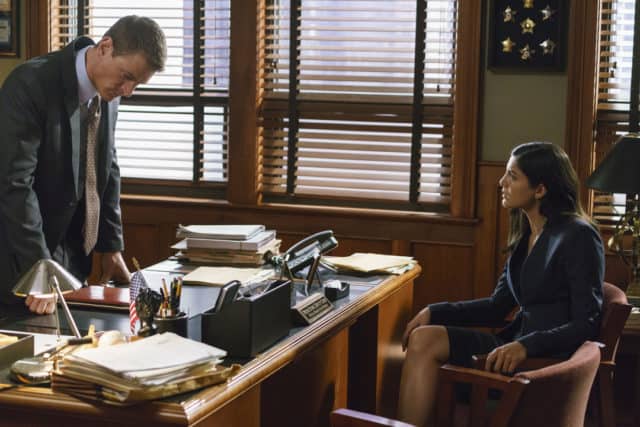
Every lawyer or other officer of the law always feels a sting for the ‘one that got away’. It’s the type of case where you know you had everything you needed, you were sure things were going to go your way, and then they didn’t. This is that case for Stone and Dawson. It was the one conviction Stone was sure of, then was completely blindsided by. What’s worse than an attorney to be blindsided is a victim’s family to be so. Luckily this is what motivates Chicago Justice officers to never give up.
Dawson and Nagel find Officer Ted Kody dead in a seedy motel where someone attempted to make his death look like a suicide. As if that wasn’t bad enough, the guy was dying of pancreatic cancer. Someone cruelly decided to cut his time even shorter. His former partner tells them that Kody had him moving meat from a butcher shop. I’m no expert, but you would have to move a heck of a lot of meat to accumulate $40,000. Stone and Dawson immediately recognize the name of the owner, John Beckett. He was a man who burned his own business down for the insurance money, but also killed an innocent farmer in the process.
Kody clams up, only saying that he was honoring a friend’s last request for privacy to earn money for his son’s college tuition. Stone thinks they’ve got a great lead when a local police officer finds the murder weapon with Beckett’s fingerprints on it. Unfortunately the rookie is sloppy with the chain of evidence, so their slam dunk case turns into a train wreck. Let this be a lesson in the importance of following the rules for evidence cataloging. Beckett does what any criminal with luck on his side does-taunts his enemy. That’s also the last thing you should do to someone who is highly motivated. Seeing Stone floundering, Jefferies has to push Stone to dig deeper into the ‘why’ factor in the case. Why kill Kody specifically, and why now? How did Kody get in the room to be killed in the first place? The jury loves a good story, so give them a believable narrative in lieu of solid evidence.
By looking through Beckett’s financials for the last five years, they realize that Kody was Beckett’s lackee all this time. He arranged for a juror in Beckett’s original arson and murder case to be bribed for her vote. With this, Stone gets a second chance. It turns out there actually is a loophole to the double jeopardy rule. When a judge or juror takes a payoff to fix the outcome of a case, it’s as if the case itself never happened. In trying the original case all over again Beckett slips up. He describes wrangling pigs on a farm a little too similarly to the way Kody’s injuries were caused. That coupled with other circumstantial evidence tells a hell of a story, one that Beckett can’t risk. Finally Stone can rest easy knowing he got justice for an innocent man.
Did you find the details of Stone’s case as educational as I did?
 Follow Us
Follow Us





